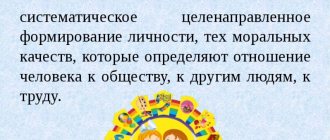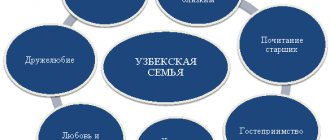Morality is a person’s internal attitude to act in accordance with conscience and free will, the individual’s internal requirements for himself. Morality is also understood as a set of norms of behavior for every person in society, the internal qualities of a person and their expression, which determine his behavior in society. Moral education is the process of forming a harmonious personality, developing a holistic value-semantic dominant in preschool children. Moral education is one of the most important stages in a child’s upbringing, necessary for his personal development in society. This process conveys to the child a system of generally accepted fundamental values that determine the relationships of people in society, in the family, as well as principles and norms based on the concepts of good and evil, truth and lies, positive and negative in a global sense. What are the main means and methods of moral education of preschool children? What is the role of moral education of preschool children in the family?
Main aspects of moral education of preschool age
The relevance of the problem of moral education is due to the crisis of modern society, in which there has been an erosion of moral norms, the importance of the institution of family, and spiritual values, which significantly complicates the path of personal development of a preschool child. Moral education is designed to contribute to the formation of a harmonious personality, aware of the norms and values that determine the foundations of relations between people in society.
The crisis of morality in society is facilitated by modern frivolous methods of raising children, in which the child receives the basics of moral education outside the family through means imposed by a demoralized society (for example, computer games that develop selfishness and cruelty).
Why should moral education begin at a very early age? During this period, the child is maximally open to emotional experience and empathy. The child takes the words and actions of adults for granted, without questioning them, which happens at an older age when the child learns to analyze words and actions, compare experiences and draw certain, not always correct, conclusions. The experience acquired by young children will later move into the category of what is proper, true, canonical, and beyond doubt.
Moral education in preschool age is implemented through a system of methods and means, but the main source of moral education and the formation of a harmonious personality of a child is his family. An auxiliary mechanism for the implementation of moral education of preschool children are kindergartens, whose role is to correct errors in raising a child in the family.
Fairy tale as a means of moral education
One of the ways to achieve the moral development of preschoolers is through reading fiction; fairy tales are especially good for these purposes. It is the fairy tale that goes through life with the baby, starting from infancy. In a fairy tale, he begins to get acquainted with the relationships of the characters, which are then transferred to the child’s relationships with relatives. Fairy tales are a means of shaping personality, with individual concepts of good and evil. They learn to construct speech, understand the hero’s experiences, and learn to relieve anxiety.
Advice: you need to select fairy tales based on the child’s age, in such a way that they develop his feelings, and not his reason; for this, fairy tales that have a simple plot are ideal.
Good fairy tales are a powerful method of moral education.
The main task of parents during moral development is based on the correct selection of fairy tales, which should only have a positive impact on the child’s emotions. A fairy tale should instill self-confidence. For young children, fairy tales such as:
- Zayushkina's hut.
- The wolf and the seven Young goats.
- Fox with a rolling pin.
- Cat, rooster and fox.
- Boasting hare.
Zayushkina's Izba is a very kind fairy tale.
Works in which good defeats evil will help to sort out the categories of good and evil, saying that evil is always punishable, this is, first of all:
- Zayushkina's hut.
- Little Red Riding Hood.
- Winter quarters.
Fairy tales are the means of shaping the moral education of preschoolers, and they do not give specific instructions, such as: listen to your parents, their plot contains a lesson that parents should discuss with their children while reading.
Still from the wonderful Soviet film Morozko
Fairy tales like this teach you to obey your parents:
- Snow Maiden.
- Sister Alyonushka and brother Ivanushka.
- Swan geese.
They talk about hard work:
- Tiny little thing.
- Princess Frog.
- Moroz Ivanovich.
- Morozko.
Basic methods of moral education of preschool children
Moral education of preschool children is a complex process of forming the child’s beliefs and value system, implemented through certain methods, which include:
- Persuasion and Conversation;
- Inspiration to action;
- Appeal to sympathy and empathy;
- Encouragement;
- Punishment.
At preschool age, the child does not yet understand what is good and what is bad, but he is maximally open to the emotional perception of the situation. Therefore, in the early period of moral education of preschoolers, standard methods are ineffective.
Many parents, in the process of educating morality in a child, assign the main role to the mechanisms of reward and punishment, incorrectly interpreting these methods, reducing them to material reward and physical punishment or material deprivation. As practice shows, this tactic is also ineffective in the long term, since physical and material deprivation is a manifestation of external moral control for preschool children. Moral education is designed to stimulate the manifestation of internal encouragement (oneself) and internal deprivation (punishment - unauthorized refusal of encouragement, benefit).
Basic means of moral education of preschool children
The thinking and ideas of a preschool child, whose moral education is realized through a certain system of means, are extremely concrete, so they need clear, understandable forms and symbols to understand such abstract concepts of moral principles as kindness, loyalty, gratitude, responsiveness, love, beauty and others. Among the main means of moral education of preschoolers are:
- Fairy tale;
- A game;
- Creative task, labor, human activity;
- Nature;
- Communication with both peers and adults;
- The collective - the children's environment - is one of the important means of moral education of preschoolers, allowing the child to develop and express his individuality within the framework of a specific society governed by its own laws and norms. This is one of the necessary mechanisms for instilling collectivism, which cannot be realized in any other conditions. The harmonious development of the individual is impossible without a team, since a person is a social being, living in society and being part of it. Raising collectivism in a child must inevitably overcome the contradiction - the suppression of the individual by the collective. Overcoming this problem independently will allow the child to learn to live and develop in society within the generally accepted framework of norms and morality.
These means of developing morality in a child are accessible and easily applicable in practice, both in the conditions of raising a child in a kindergarten and in the family.
System of means of moral education
There are a lot of means to educate a person’s spiritual culture. These include general and specific forms. The most common form of informing schoolchildren about norms and values; discussion of the most pressing problems. The traditional method is ethical conversation. It promotes the acquisition of knowledge, the formation of ethical ideas, views, concepts, the formation of interest in moral problems, the desire to evaluate the highly moral or immoral behavior of people.
Conversation helps to understand difficult situations and moral issues, form a strong position, help everyone understand their personal experience of behavior, and helps instill the skills to develop their own views and ideals. An important group of methods includes involving the child in various forms of activity : labor, aesthetic, artistic, sports and other types.
The main means are:
- artistic media;
- surrounding living and inanimate nature;
- own activities;
- communication;
- environment.
Artistic means of education
This group of means, which includes literature, various types of fine arts, cinema and music, theater, is very effective in shaping the moral qualities of a little person. It helps to impart emotional coloring to cognizable complex moral phenomena. These means are the most effective in developing complex moral qualities, feelings, and ideals.
Moral education is promoted by a book that develops the moral and volitional spheres, promoting the formation of a unity of consciousness, worldview, and behavior. With its help you can instill the most important moral standards.
The means of education can be any object of art or creativity, it all depends on the efforts of the teacher. Any works of art or folk art make a huge impression on a child ; they depict the world realistically, which makes them understandable to anyone, including a preschool child who is just learning to understand the world figuratively and feel it.
Nature
Nature and natural phenomena help to instill in pupils a feeling of caring for the world around them, protecting those who are much weaker and who need outside help. Nature helps to form the initial foundation for the development of a sense of humanity and confidence . The influence of nature and its objects on a child is multifaceted and, with the right approach, has significant potential for educational influence.
Own activity is a practical means of moral education
Any activity of a child: play, creativity, work or study, is a means of developing moral qualities. Each type of activity has its own specifics and performs work on the formation of specific qualities, the development of which is difficult through other means.
Activities are primarily necessary to instill skills in practicing morally correct behavior. One’s own activity has enormous practical significance: it allows one to assess the moral influence of a child in the process of interaction with other people, children or adults.
Communication
Communication is given special attention. It, as a means of forming morality, fulfills the task of adjusting basic moral ideas and moral relations in the society around a person. Only in communication, feelings, qualities and moral ideals that have been formed or have begun to form are consolidated and acquire the character of skills and abilities.
Environment
The environment, the atmosphere in which a child constantly lives and studies, plays an important role in the formation of a moral culture. An atmosphere permeated with goodwill, love, and humanity will always have a positive effect on a person’s upbringing , and on the contrary, an immoral and cruel environment can only form negative character traits.
The environment, activating the entire previously formed potential of moral qualities, becomes a means of developing moral feelings and correct norms of behavior.
The role of moral education of preschool children in the family
The fundamentals of moral education of preschool children are implemented in the context of the family. A child, like a little imitator of adults, copies the behavior of his parents, adopts their tactics of dealing with each other and with other people in society. Parents should realize that it is impossible to raise a harmonious, highly moral personality in an unhealthy family atmosphere in which disrespect, selfishness, laziness, and deception prevail.
The family is the main environment for a child to gain experience and knowledge. Kindergartens and other educational institutions are intended only to correct the mistakes parents made in raising preschool children. The moral education of a child in the family must be implemented with maximum respect for his personal dignity. The formation of a child’s moral behavior should not be accompanied by the suppression of his initiative and the manifestation of personal qualities.
For a preschool child, moral education is implemented through the prism of family relationships, which should become that natural role model, by inheriting which the child could become a moral member of society.
For a preschool child, moral education in the family is the basis for the development of his personality.
Methods and forms of spiritual and moral education of preschoolers; methodological development
Municipal autonomous preschool educational institution
"Kindergarten No. 74 in Kaliningrad
Forms and methods of spiritual and moral education
preschoolers in MADOU d/s No. 74
(as part of the program implementation
"Origins on sociocultural experience")
Prepared by:
Teacher of the highest qualification category: Gulyaeva Lyudmila Viktorovna
Kaliningrad
2020
Let the child feel the beauty and admire it, let the images in which the Motherland is embodied be forever preserved in his heart and memory.
V. A. Sukhomlinsky.
Preschool childhood is an important period in a child’s life, when a sense of their own capabilities, the need for independent activity, basic ideas about the world around them, good and evil in it, ideas about family life and their native land are formed. We live in a time when the child’s environment is oversaturated with digital sources of information, which has a detrimental effect on the development of moral foundations in society. The child must acquire moral guidelines in a technically and materially saturated environment. That is why, instilling in a child moral and spiritual values is one of the urgent tasks of preschool education. Currently, this area of work for teachers is actively developing, including new methods for developing children’s personal qualities.
Early childhood is the time to effectively establish value guidelines in life.
The goal of spiritual and moral education in a preschool institution is to develop in children a humane attitude towards the world around them.
The following moral tasks are implemented in preschool educational institutions:
- To develop the ability to empathize in children;
- Instill respect for one’s own nation and for representatives of other nationalities;
- Foster love for home and family;
- Acquiring knowledge about the culture and history of the native country;
The tasks of spiritual and moral development are implemented within the framework of the following educational areas:
- Spiritual and educational direction (classes, reading to children, conversations, oral teachings, discussion of actions, etc.);
- Educational and health-improving areas (holidays, outdoor games, physical education, walks);
- Cultural and educational direction (concerts, watching films and cartoons, listening to audio recordings, participating in holidays and entertainment);
- Moral and labor direction (self-service work, making gifts, attributes for games).
This is not the first year that our preschool educational institution has been working on the spiritual and moral education of children of all age categories. In April 2022, our kindergarten is a supporting platform for the spiritual and moral education of preschoolers. The work is carried out according to the program “Origins on sociocultural experience”.
The purpose of our work is:
- Preserving the spiritual and moral health of children. Introducing them to the moral and spiritual values of Orthodox culture.
- Studying the history, culture, natural and ecological uniqueness of the native land, Russia.
- The desire to revive the traditions of family education.
In order to achieve our goal of spiritual and moral education, we face the following tasks
- Create the necessary conditions in preschool educational institutions for organizing work on spiritual, moral, patriotic education.
- Increase the professional level of teachers.
- Provide the educational process with the necessary fiction and pedagogical literature.
- Orient the family towards the spiritual and moral education of children (familiarizing parents with the basics of Orthodox pedagogy and psychology, forming ideas about the forms of traditional family life.)
Objectives of the educational system:
- Development of moral consciousness, feelings, behavior of the child.
- Formation of the emotional-volitional sphere of the personality of a preschooler.
- Development of social skills and behavioral skills.
- Cultivate a positive attitude towards the world.
To achieve the set goals for the spiritual and moral education of children, our preschool educational institution had a subject-spatial environment.
- Creation of a mini-museum of decorative and applied arts “Gornitsa”;
- Creation of a mini-museum of folk-patriotic direction “Where the Motherland Begins!”
- Creation of the Center for Family Spiritual Development “Faith, Hope, Love”;
In each age group, small zones of spiritual and moral, as well as national patriotic education are allocated; There are materials for moral development: books on the topic of friendship and family, story-based posters and pictures about one’s hometown and country.
Forms and methods of work on the spiritual and moral education of preschool children in MADOOU d/s No. 74:
- Direct educational activities (DEA);
- Game activity;
- Labor activity;
- Reading fiction;
- Interaction with society;
- Project activities;
- Club work;
- Interaction with parents;
- Off-duty activities.
GCD
Systematic educational activities are an important means of educational work with children of all age categories. During classes, children, together with the teacher, study fairy tales, poems and stories, discuss people’s actions and character traits. In accordance with the age of the pupils, our preschool educational institution constantly conducts conversations in which children get acquainted with situations in which certain moral qualities of a person may manifest themselves. Much attention is paid to reading fiction, watching presentations, films and television shows. By introducing children to the world around them, we try to cultivate love and respect for nature. Integrated GCDs can be organized around a variety of topics.
Reading fiction
Works for joint reading with preschoolers always contain an element of moral education. Reading works of fiction makes children empathize with the characters and gives them the opportunity to appreciate the character’s good deed. Parallel viewing of illustrations to works helps children quickly understand the meaning of the emotional content of the characters.
Labor activity
Morality is cultivated by involving children in labor actions: helping within their means in general cleaning in a group, on the veranda in mini-museums, at clean-up days. Gift-making activities: crafts, postcards for various holidays and events contribute to the development of respect for manual labor.
Play activity
Play is undoubtedly the leading activity of a preschooler. It is through play that a child learns about the world and prepares for adult life. The game is based on the perception of the presented rules, thereby orienting the child to adhere to certain rules of adult life. The child absorbs lifestyles and strives to imitate the actions of adults. Mental and thinking abilities are developed through gaming activities. Moral norms are actively absorbed by children in play activities.
Moral games with objects are held with children of primary preschool age (1.5-4 years). The teacher acts as a partner and develops play activities and includes a moral aspect in the content of the game. By the age of 5 years, the ability for role-playing games is formed. Children actively interact with each other, they like to try on different roles. In moral role play, children are encouraged to act within social or literary roles that introduce moral values.
As part of moral education, didactic games are actively carried out, the material for which is illustrations based on familiar fairy tales, series of plot pictures, poetic texts, etc.
Games are played both in groups and outdoors.
Cooperation with society
Our kindergarten actively cooperates and interacts with public organizations in Kaliningrad:
- GUK COM "Art Gallery";
- Kaliningrad Regional Puppet Theater;
- Regional Children's Library named after. A. Gaidar;
- Children's music school named after. Gliere;
- Artist's House;
- City Park of Culture and Recreation";
- Municipal educational institution secondary school No. 14;
- GAUKO DO “Kaliningrad Regional Children and Youth Center for Ecology, Local History and Tourism.
Club work
In our preschool educational institution, circle work is constantly carried out with children of different age groups. Classes are carried out in accordance with the chosen program of additional education. There are several areas of circle activity.
- Circle “Wonders of Nature” (cognitive development). The circle has an environmental focus. By studying in a circle, children enrich their knowledge base with new in-depth knowledge about natural phenomena.
- “Healthy” circle (physical development)
- Club “Visiting a Fairy Tale” (artistic and aesthetic development).
Club work, which is carried out with children in various directions, actively overlaps with the work that is carried out in order to develop the spiritual and moral qualities of pupils.
Project activities
The project method involves the use of a variety of teaching tools and techniques, as well as the need to integrate various types of knowledge and skills. The project method is relevant and very effective. It gives the child the opportunity to experiment, synthesize acquired knowledge, and develop creative abilities. Mandatory components of the project: children's independence, co-creation of children and adults, development of communication abilities, application of acquired knowledge in various types of activities. The project consists of several stages. The first stage is determining the topic, type of project, goals and objectives become. The second stage is preliminary work (conversations, observations, excursions, reading literature). The third stage is the practical part (experiments, games, artistic and productive part, creation of collections). The fourth stage is working with parents. The final stage is the result of project activities.
Interaction with parents
One of the most important tasks of a kindergarten in spiritual and moral education is to establish a close connection with the family. Family and preschool are two important institutions for the socialization of a child. Working with parents includes:
- Meetings on spiritual and moral topics;
- Open classes of the educational process;
- Questions and answers evenings;
- Questioning and testing;
- Involving parents in the preparation and holding of holidays and open classes;
- Excursions;
- Individual and group consultations;
- Visual types of work;
- Carrying out joint events;
- Involving parents in feasible work to improve the territory of the preschool educational institution.
The main goal in working with families is to achieve unity in raising a child.
Off-duty activities
Extra-curricular activities in spiritual and moral education are carried out through 2 directions - entertaining and educational. Entertainment in kindergarten includes various forms of leisure: holidays, performances, folk entertainment, creative evenings and master classes. Various types of children's activities will be combined in entertaining forms: pupils dance, sing, make something, and participate in competitions. Educational activities include excursions, hikes, etc.
Currently, as part of the implementation of the Concept of spiritual and moral development and education of pupils, the following events have been organized and carried out in our MADO kindergarten No. 74:
- Conducting a seminar “Family and kindergarten - a single educational space” (2018).
- Conducting a master class (on the basis of the Center for Children's Recreation, kindergarten No. 105) Traditional folk doll “Easter Dove” (2018);
- Celebration of the Nativity of Christ in kindergarten (annually);
- Conducting a regional seminar “Spiritual and moral education of preschool children” (2019);
- Carrying out an entertainment event with elements of theatrical activity “Folk Game Day”;
- Carrying out entertainment events dedicated to major Orthodox holidays;
- Project activities on spiritual and moral education are regularly carried out.
- Every year, teachers from our preschool educational institution take part in the scientific and practical conference “At the Origins of Creativity.”
Spiritual and moral education should be perceived as an integral system of means and techniques for the development of children. The work of a teacher in developing moral qualities in every child extends beyond the boundaries of kindergarten. The teacher actively interacts with parents - family values are restored and strengthened. Preschoolers’ ideas about the meaning of morality in people’s lives are expanding. The formation of humanists and patriots begins in early childhood, and the main guides are the family and kindergarten.




